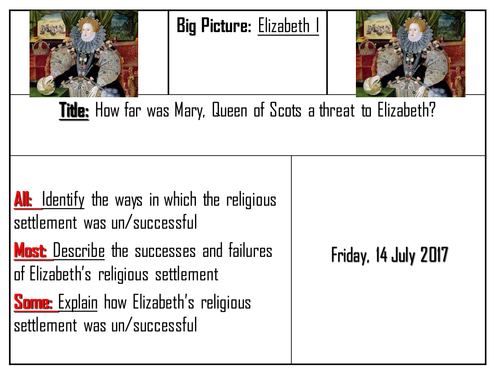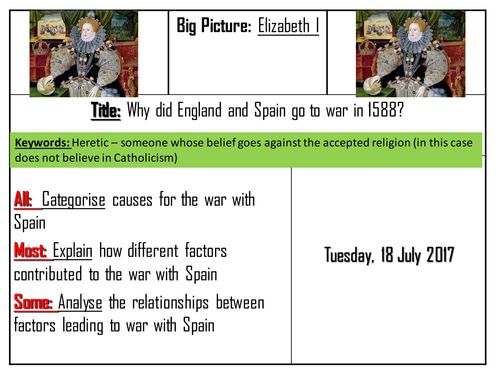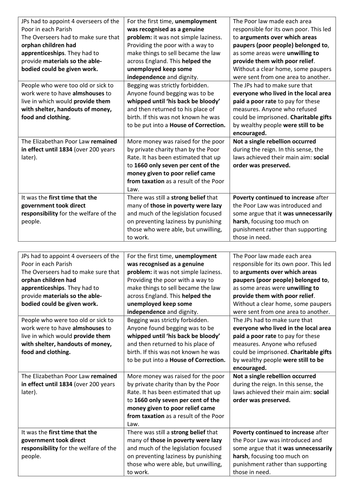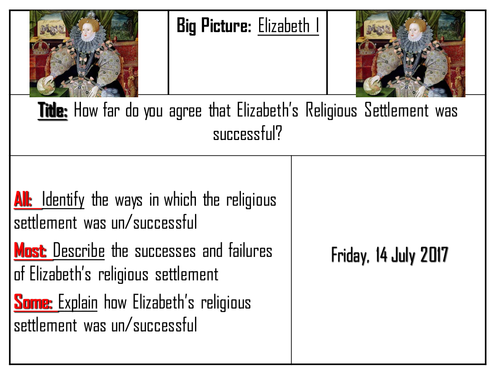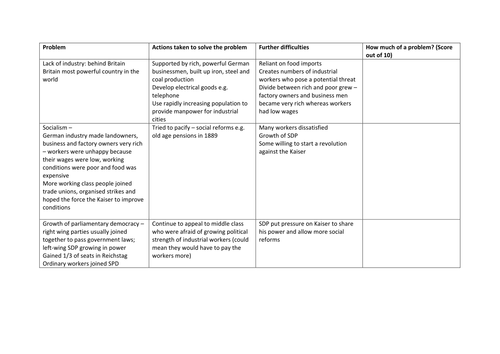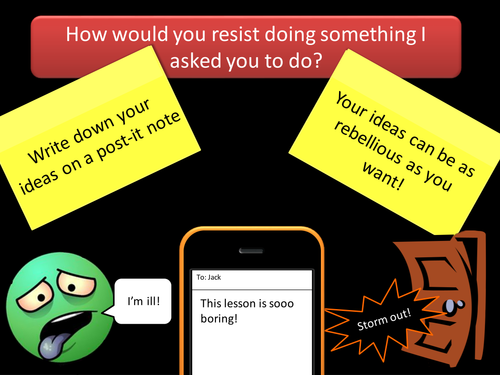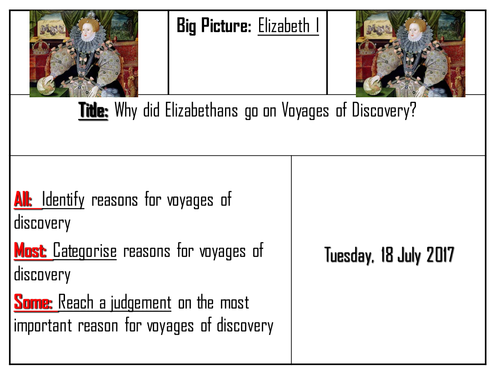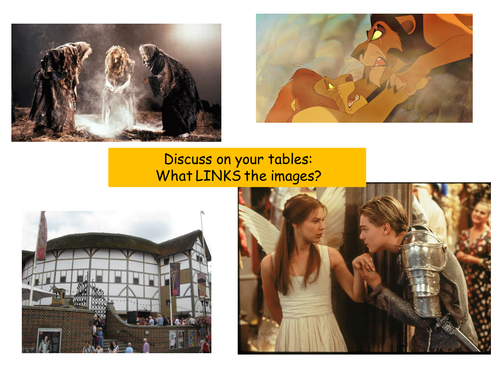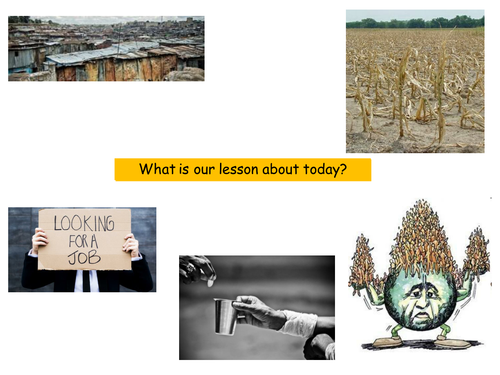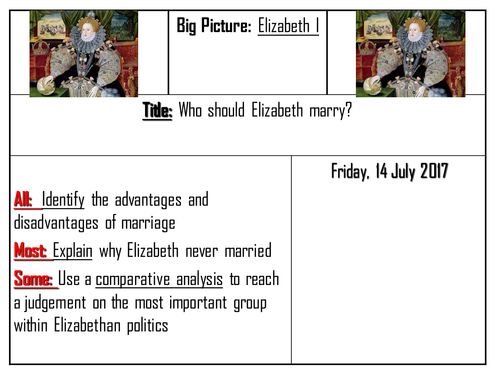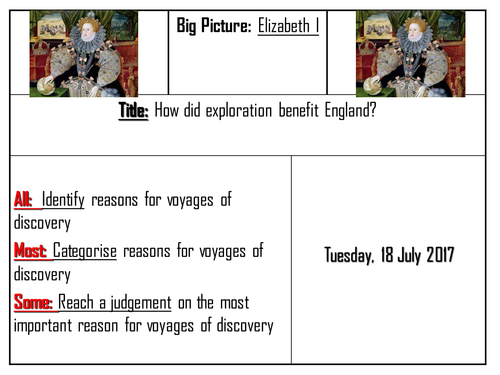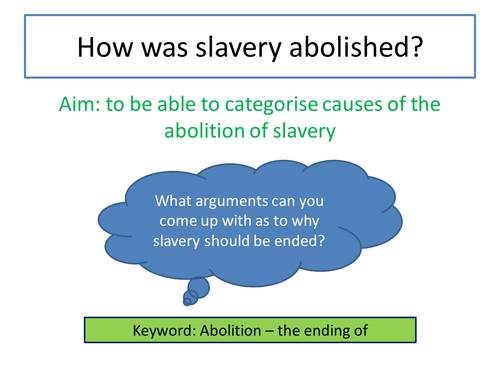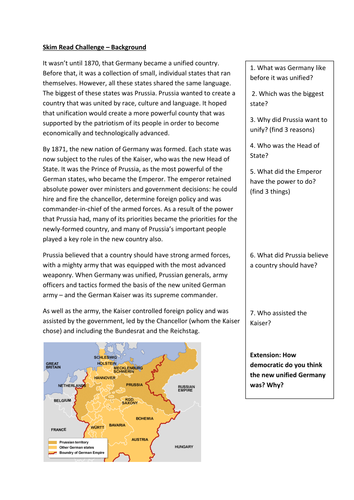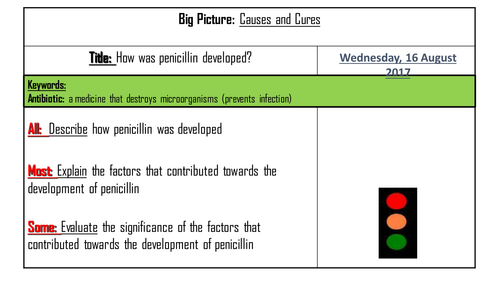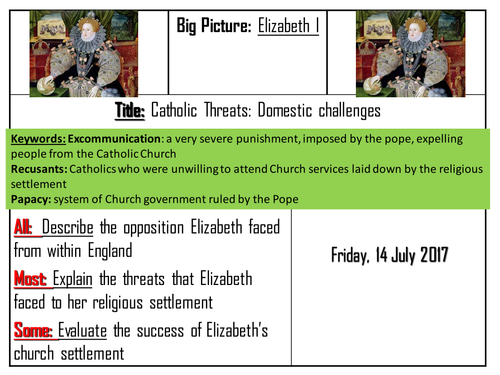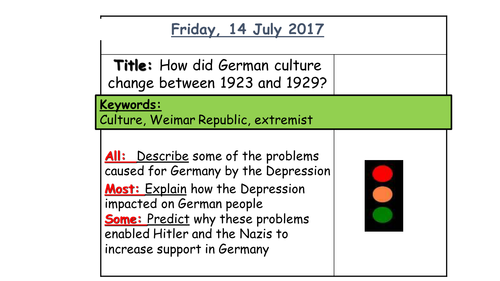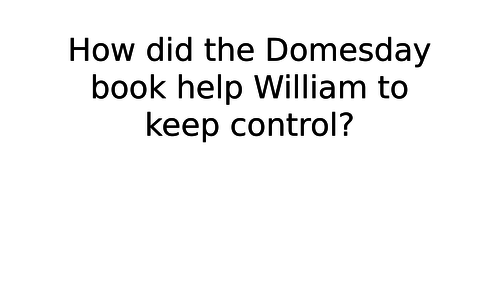
170Uploads
40k+Views
18k+Downloads
All resources

AQA 8145 Elizabeth I - How was Mary, Queen of Scots, a threat to Elizabeth?
A GCSE lesson in which students examine the plots against Elizabeth that Mary, QofS was involved in. Students will reach a judgement on the severity of the threat posed by Mary, QofS. Students will apply their understanding of this topic to an 8 mark 'write an account' question.

AQA 8145 Elizabeth I - Causes of the war with Spain
A differentiated GCSE lesson in which students explore the causes of the war with Spain. Students will practice the skills necessary for a 16 mark essay question and link their knowledge here to their prior understanding. Students will categorise the causes and consider the role of long and short term factors.

AQA 8145 Elizabeth I - 1601 Poor Law
A GCSE lesson for the unit on Elizabeth I focusing on the success of the 1601 Poor Law. This covers initial Elizabethan laws before studying the 1601 law in some depth.

AQA 8145 Elizabeth I - How successful was the Religious Settlement?
A GCSE lesson which works well as a summary to religious threats to Elizabeth's throne. Students will form an argument by evaluating the successes and failures of Elizabeth's Religious Settlement. Students will need to recap their previous learning on the topic. Includes preparation for an 8 mark 'write an account' question.

AQA 8145 Germany - Challenges to the Kaiser
Lesson 2 for AQA GCSE for Germany: Democracy and Dictatorship on the problems faced by the Kaiser during his rule. This lesson covers industrialisation, growth of socialism and rise of parliamentary democracy.

Slavery - Slave resistance
A KS3 lesson in which students understand and evaluate the methods of resistance used by slaves on plantations. Students will have to prioritise the methods according to different criteria to gain an understanding.

AQA 8145 Elizabeth - Reasons for voyages of discovery
A GCSE lesson in which students explore the reasons why voyages of discovery were possible during the Elizabethan era. Students will also examine famous examples of Elizabethan explorers to understand their contributions.

AQA 8145 Elizabeth I - The Theatre
A GCSE lesson in which students understand why the theatre became more accepted and popular during Elizabethan England. Students will study the key features of the Globe theatre and popular Elizabethan playwrights such as Shakespeare and Marlowe.

AQA 8145 Elizabeth I - Causes of poverty
The first in a 3 lesson series on poverty in Elizabethan England. Students will categorise the causes of poverty and explain how these caused an increase in the number of poor people. Students will analyse these causes by making links between categories to reach a judgement on the significance of factors.

AQA 8145 Elizabeth I - The issue of marriage
A GCSE lesson examining the reasons why Elizabeth never got married. Students will evaluate the pros and cons of Elizabeth's suitors in order to prepare for an 8 mark 'write an account' question on the issue of marriage.

AQA 8145 Elizabeth I - Voyages of Discovery: benefits
A GCSE lesson on the benefits of voyages of discovery for Elizabethan England. Students will study the voyages of Drake and Raleigh in more depth and understand their contribution. They will reach a judgement on who was more significant for Elizabethan England. Links to a GCSE interpretations question on the motives of Drake for going on voyages of discovery.

AQA 8145: Conflict and Tension Cold War - U2 Crisis
A GCSE lesson in which students will analyse evidence to reach a judgement as to why the Paris Peace Summit failed. Includes exam practice and source analysis tasks to develop the necessary skills for their GCSE exam.

Abolition of Slavery
A KS3 lesson in which students categorise the reasons for the ending of slavery. Students will gather evidence and begin to consider the most important factor in ending slavery.

AQA 8145 Germany: Who was powerful in the Kaiser's Germany?
Lesson 1 on the AQA GCSE specification for Germany: Democracy and Dictatorship. This lesson introduces the power structure within Germany and the Kaiser's role. Students will be able to form a judgement on the relative power of each influencing factor.

AQA 8145 Medicine - Development of Penicillin
A GCSE lesson in which students explain and evaluate the role of key factors in the discovery and subsequent development of penicillin before using their understanding to complete an 8 mark 'compare' exam style question.

AQA 8145 Conflict and Tension: Cold War 1945-1972 - Causes of the Cuban Missile Crisis
A GCSE lesson in which students examine the developing relationship between the USSR and Cuba, and the reasons for it. Students will explain how both the Cuban Revolution and the Bay of Pigs Invasion pushed Cuba closer to the Soviet Union, ultimately leading to missiles being sited there. Students will consider which event played a more significant role. Includes exam practice of a 4 mark source question with guidance.

AQA 8145 Elizabeth I - Domestic Catholic Threats
A GCSE lesson in which students examine the threats to Elizabeth's rule from within England. Students will apply their understanding of the threats to decide if Elizabeth's religious settlement was successful or not. Students will also gather information about the positive impact of Elizabeth's settlement.

AQA 8145 Germany - Weimar Culture
A GCSE lesson looking at the changes in culture under the Weimar Republic between the years 1924 and 1929. Students will describe and explain the changes, and link these changes to their understanding of the recovery of the German economy under Stresemann.

AQA 8145 Elizabeth - Religious Threats from Abroad
A GCSE lesson examining the religious threats faced by Elizabeth from abroad. Students will begin to analyse the success of the religious settlement in preventing threats. Should be taught after threats at home.

How did the Domesday Book help William keep control of England?
A KS3 lesson on the Domesday book and its role in helping William keep control. Best taught after the Feudal system as contains a comparative analysis for students to reach a judgement on the most effective method of control.
Includes interactive student activities and team exercises.

